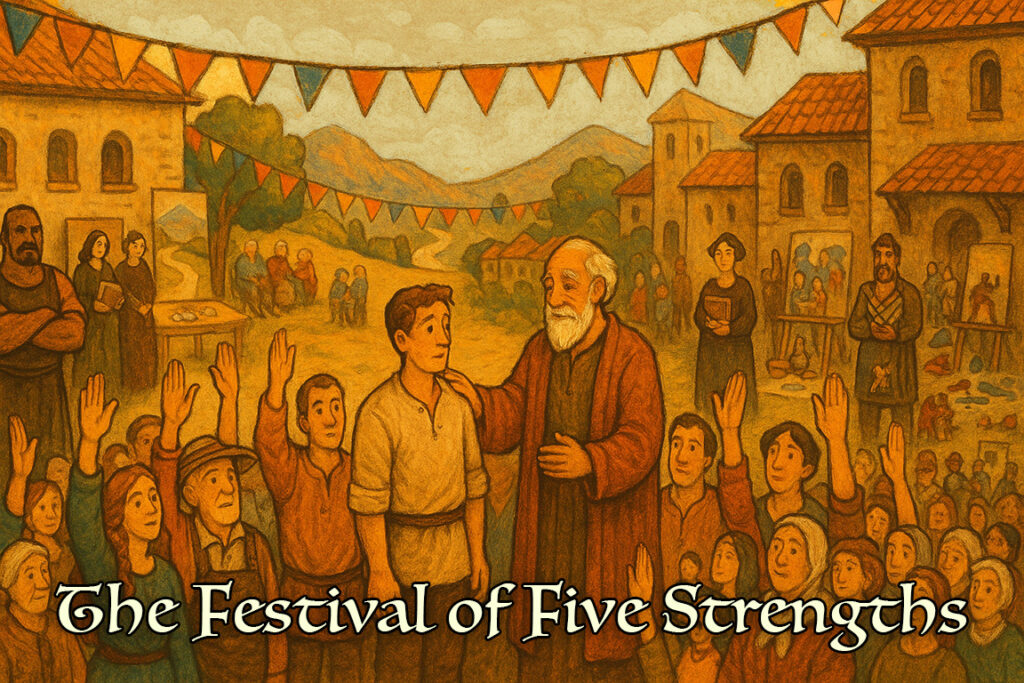The Festival of Five Strengths

In the village of Eldergrove, once every few years, the townsfolk held a great festival to discover who among them was truly the strongest. But this wasn’t about muscles alone—they believed strength wore many faces. So they devised five challenges: one to test physical endurance, another to test mental sharpness, a third to test emotional resilience, a fourth to test creativity, and a fifth to test kindness under pressure.
The rules were simple: anyone could enter any challenge they wished. There was no requirement to participate in all five—or even more than one. At the end, the villagers would vote for whoever had impressed them most, and that person would be honored as the strongest among them.
The morning of the festival, the village square filled with people, each considering which challenges would best showcase their abilities.
The first challenge was physical—a steep mountain trail that wound through the forest and back. Marcus, the blacksmith, stepped forward confidently along with a handful of others who knew their physical prowess. He surged ahead of everyone, his powerful legs carrying him up the slopes with ease. When he crossed the finish line, the crowd erupted in cheers. Marcus raised his arms in triumph, his chest swelling with pride. He glanced at the announcement board listing the remaining challenges and shook his head. “I have shown my strength,” he declared. “Why risk embarrassing myself at things I’m not built for?” And he stepped back into the crowd, content with his decisive victory.
The second challenge tested the mind—a complex series of puzzles and riddles that had stumped villagers for generations. Elara, the merchant’s daughter who spent her evenings buried in books, stepped forward along with other scholars and strategic thinkers. She solved them faster than anyone had ever seen. When the elder announced her victory, she smiled knowingly. “Intelligence is the greatest strength,” she said. She looked at the list of remaining challenges—physical endurance, emotional resilience, creativity, kindness—and laughed softly. “Not my domain,” she murmured, and returned to the crowd, satisfied she had proven what mattered most.
The emotional challenge came next—participants had to sit with the village’s oldest members and listen to their sorrows, their regrets, their fears, without turning away or offering empty comfort. Just presence. Just witness. Only a few people volunteered for this one; it was known to be draining. Miriam, who had nursed her own dying mother through a long illness, held space with such grace that even the elders wept with relief at being truly seen. “Resilience of the heart,” the crowd murmured in awe. Miriam bowed deeply, then quietly withdrew, knowing she had nothing more to prove.
The fourth challenge called for creativity—to make something beautiful from scraps and broken things scattered in the village center. Stefan, the carpenter’s son with an artist’s soul, entered eagerly along with a small group of artisans. He fashioned a sculpture so moving that people stopped and stared in silence. He too smiled and stepped back into the audience, his point made.
Then came the final challenge—kindness under pressure. Each participant had to navigate a staged crisis: a child’s desperate tears, an angry neighbor’s accusations, a stranger’s urgent need, all at once, all demanding attention. A modest group stepped forward, and two managed the chaos with admirable grace, earning warm applause before they too returned to watch the proceedings.
And then there was Thomas.
Thomas hadn’t won anything. In the physical challenge, he’d finished near the back, stopping twice to catch his breath and once to help an elderly woman who’d wandered onto the trail. In the mental challenge, he’d puzzled over the riddles with furrowed brows, getting most of them wrong, laughing at his own confusion. During the emotional challenge, he’d cried along with the elders, his presence genuine but clumsy. His creative piece looked like something a child might make—sincere but unremarkable. And in the kindness challenge, he’d gotten flustered, mixing up what everyone needed, though his heart was clearly in the right place.
But Thomas had done something no one else had: he’d attempted every single challenge.
When the five challenges ended, the village elder stood before the crowd. “Now comes the final test,” she announced. “You, the people of Eldergrove, must vote. Who among all the participants showed the truest strength?”
The villagers murmured among themselves. Marcus called out, “Surely the choice is obvious! Look at those who won!”
But an old farmer raised his hand. “I vote for Thomas.”
Heads turned.
“Thomas?” someone asked, confused. “But he didn’t win anything. He failed at every test.”
“No,” said the farmer slowly. “He didn’t win any test. But he didn’t fail either. He kept going.”
A woman who’d watched the mountain challenge spoke up. “When Marcus finished the race, he was done. But when Thomas crossed that line, exhausted and last, he went straight to the second challenge. I saw him. He could barely breathe, but he showed up.”
“And after he got the riddles wrong,” added another, “he could have slipped away in embarrassment. Instead, he sat down for the emotional challenge like nothing had happened.”
“I watched him cry with my grandmother,” said a young man. “He wasn’t the most resilient—he was a mess, honestly—but he stayed. Then he went and made that crooked little sculpture, and I could see he was tired. His hands were shaking. But he tried.”
One by one, hands began to rise. Thomas stood in the center of the square, bewildered, as the votes piled up.
The elder counted slowly, then turned to face the crowd. “The village has spoken. Thomas has received more votes than any single victor.”
“But I lost everything,” Thomas whispered.
“No,” said the elder, placing a hand on his shoulder. “Everyone else stopped after proving one strength. You proved something else entirely—that you could face what you weren’t good at and still move forward. That you could fail and still show up. That you could be afraid, be inadequate, be exhausted, and still take the next step.”
She turned to address everyone gathered. “The winners showed us their gifts. But Thomas showed us what to do when we don’t have the gift we need—and that is when we most need strength.”
Marcus, standing at the edge of the crowd, felt something shift in his chest. “I was strong enough to climb the mountain,” he said quietly. “But not strong enough to risk failing at something else.”
The elder nodded. “Exactly. True strength isn’t conquering the places where we shine. It’s showing up to the places where we might fall. And showing up again after we do.”
Thomas, still stunned, looked around at the faces of his neighbors. “I just… I thought that’s what you were supposed to do. Try.”
“Yes,” said the elder, and now she was smiling. “That’s exactly what you’re supposed to do. And you’re the only one who did.”
That evening, as the festival fires burned low, the village celebrated not the one who never fell, but the one who, having fallen five times, took five more steps forward.
And in Eldergrove, that became the new measure of strength: not perfection in one thing, but persistence through everything.
